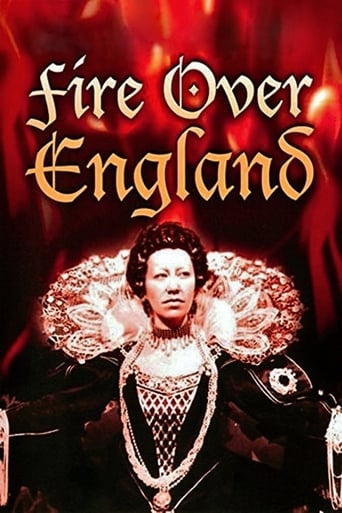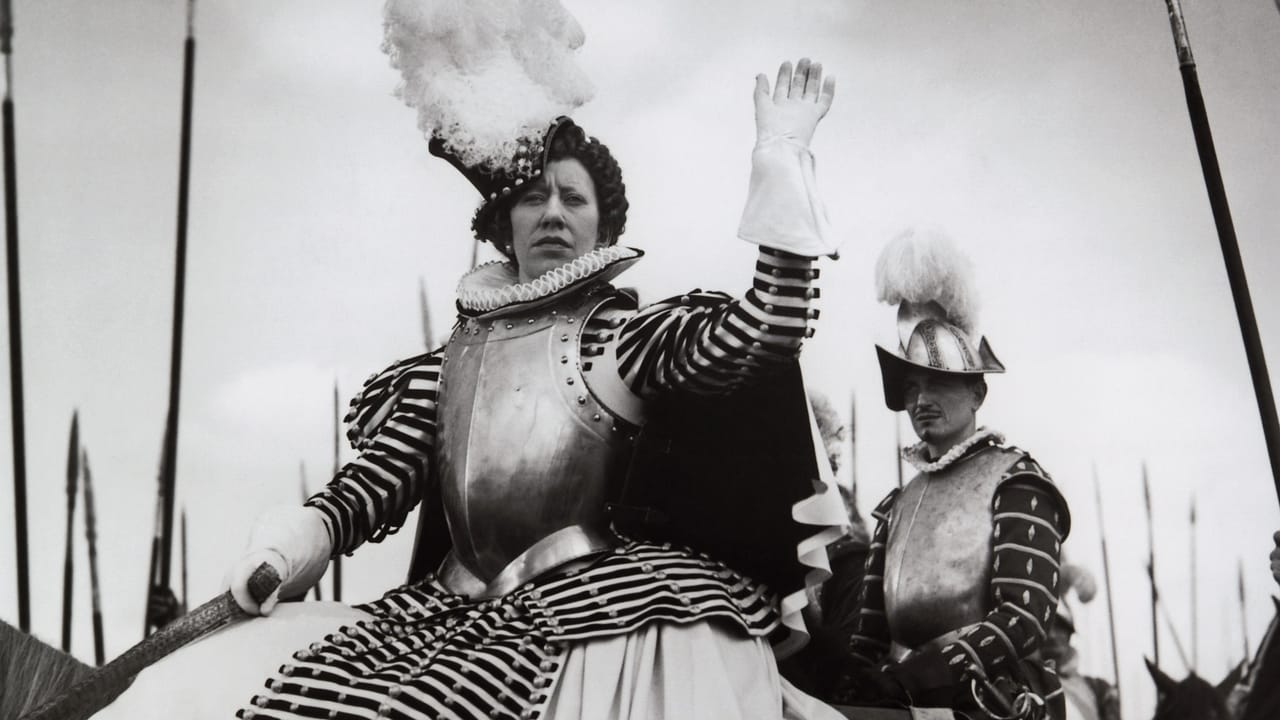russellalancampbell
Flora Robson's portrayal of Elizabeth1 is monumentally great. She dominates her own conflicted emotions as she dominates her subjects and country. "Give me my disguises" she commands her lady in waiting in order to hide her blemishes, loss of hair and age. It is done not merely in the name of vanity but as a requirement of her position. She subverts her emotions in the name of duty and country. If the real Queen Bess was as forceful and charismatic as Robson's portrayal, then it is easy to see why England followed her lead. Olivier is quite good as the young, eager adventurer and emissary to Spain but it is Vivian Leigh that demonstrates the screen craft that was to carry her to fame. The film is not historically accurate but then neither were Shakespeare's history plays. The film reveals much about the human condition and, if you want to know "what really happened", look it up at a history website rather than watch a film.
Red-125
Fire Over England (1937) was directed by William K. Howard. It stars Flora Robson as Queen Elizabeth I. Robson wasn't a great beauty, which meant that she had to bring real acting talent to her roles. Talent is what she had, and this talent is evident in the film.Robson makes Queen Elizabeth come alive for us, as a powerful woman, who could be cruel and demanding, but who truly wanted the best for her people and her country.The historical Elizabeth was vain, and Robson portrays this well. She demands an "unblemished mirror," although she is aware that the mirror reflects the blemishes on her face. Her scene at Tilbury Field is shortened in this movie, but it's still powerful. (Incidentally, the Spanish Armada--the key historical event that drives the plot--took place in 1588, when Elizabeth was 55 years old. Robson was 35 when the movie was made, but looks older, so historical accuracy is preserved.)Vivian Leigh plays the ingénue role of Cynthia. It's not a great role--she mostly simpers. Laurence Olivier plays Michael, the dashing young hero. Of course, their future together is part of cinematic history.Look for James Mason in a minor role, and Raymond Massey as King Phillip II of Spain.The film was shot in black and white by the talented James Wong Howe. It will work better on the large screen, but it worked well on DVD, which is how we saw it.
gamay9
I watched this movie on TCM this morning, from start to finish, and was totally bored. This is British filming at its' best but not my best.Flora Robson and Laurence Olivier were stage actors who just recited their lines...i.e. no emotion, just typical of the 'English way' (to quote Pink Floyd)and yet, American TV (Fox News) promotes journalists, such as Jonathan Hunt and Stuart Varney because U.S. born citizens love the British accent.The only talented actress in the film was Vivien Leigh, who had a small part. I was eight years old when I first saw 'Gone With the Wind' and I really thought she was a southerner. Then, she married snobbish Laurence when she could have married a U.S. actor stud, and I lost all respect for her. So did movie studios.TCM is airing British films without respect for how little they have contributed to international cinema. How about televising great films? Like Bardot's best or 'Montenegro,' the latter being my all-time favorite. I even rank that film above 'The Best years of Our Lives,''Forrest Gump,''Gone With The Wind,''Rain Man,'Casablanca' and 'Shane.' I have been to every major European country in my lifetime (so far) and I'll take any over England; bland people with no direction. Give me Madrid, Berlin, Paris, Copenhagen and many others over London.
theowinthrop
There is not real film about the events leading to Philip II's great enterprise of 1588, the sailing (and destruction, as it turned out) of the great Spanish Armanda. To understand the story would take too many twists and turns. I recommend Garrett Mattingley's classic account of the Armada from the 1950s for those interested. Philip, tired of the aid that Elizabeth I of England gave to the Dutch and French Protestants, made a plan to transport an army under his nephew, Alexander Farnese, Duke of Palma, from Belgium to England using the Armada. He put the fleet under command of the Spanish nobleman, the Duke of Medina Sidonia. But Medina Sidonia was not a sailor (although a conscientious nobleman and servant of Philip). The Armada would first suffer a raid (by Walter Raleigh and Francis Drake). After it was repaired it did sail, only to find the faster English ships of Drake, Howard, and Frobisher more deadly, and the heavy winds, seas, and storms even deadlier. Many ships were wrecked off Scotland and Ireland. It was one of the worst naval catastrophes of history.However it was also Philip's finest moment. Always a firmly religious man, he did not despair at the disaster to his fleet and plans, but he saw it was God's will. He actually put together Armadas again twice in the 1590s, but neither got as far as the first one did.The complications of the story make it too confusing for anything but a full television seris: Philip was spurred on when Mary, Queen of Scots was executed in 1587 - he had been named her appointed heir to the English throne in her will; the French religious wars were approaching a critical moment, and Mary's uncle (the Duc de Guise) was leader of the Catholic forces at war with King Henri III of France and King Henri of Navarre (the leader of the Huguenots). There have been films dealing with Elizabeth's sea rovers, such as Drake ("Seven Seas To Calais", "The Sea Hawke"), but only this film tries to tackle the actual story of the Armada. As an adventure story it is excellent. As history, not exact but pretty good in parts.First it does touch briefly on Mary's execution, in an early scene where one of Mary's servants tries to assassinate Elizabeth (Flora Robson). It really concentrates on the complex world of Elizabethan spying and the Elizabethan Catholic "underworld". The latter is an unfair description, for the Catholics were being persecuted in England. They had been supporters of Mary, and now that she was killed they gave support (mostly begrudgingly) to Philip. England's master of spies was Sir Francis Walsingham (who does not appear in this film). Instead the espionage against Spain is handled by Robert, Earl of Leicester (Leslie Banks) in the film - but in fact, Leicester died in 1587 in Holland, so he was not around for the Armada.Lawrence Olivier is splendid in this early role as the young agent sent to spy on Philip and his plan (going in place of James Mason, who committed suicide in trying to avoid arrest). Olivier manages to get close to Philip (Raymond Massey) but that is not fully possible. Philip does not even like Englishmen, but he is willing to go along with the Catholics to get rid of Elizabeth and her regime. Philip is not easy to fool, and in a marvelous (almost comic moment) he stops Olivier from disclosing anything by finding that there was one name Olivier does not know that he should.I won't go into the rest of the film's story. Watch it to see how Olivier still manages to escape and save England, and end up with his love (Vivian Leigh). For a 1937 historic film it is quite good, even if it could not tell the completely true story of the invasion of 1588.


 AD
AD



